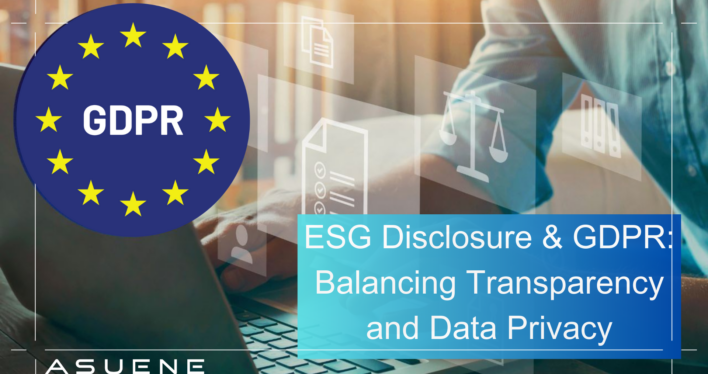- Article Summary
-
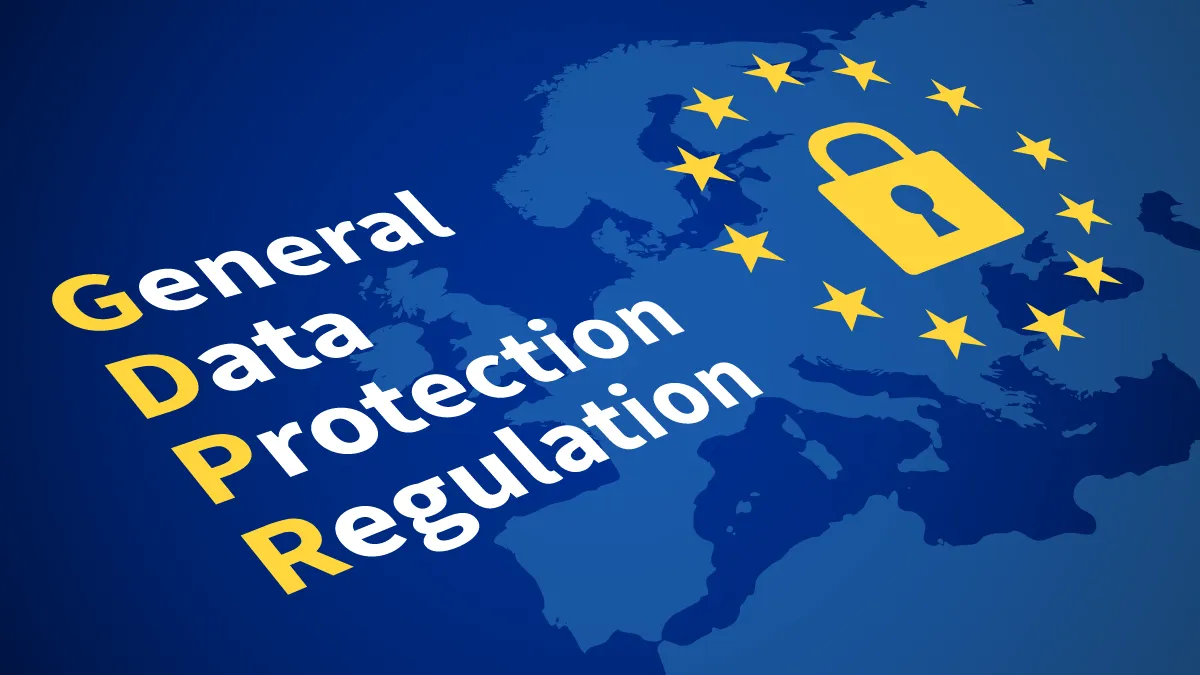
Overview
ESG disclosure is now a key aspect of corporate transparency in sustainability reporting. Employees, investors, customers, and regulators increasingly expect companies to share their environmental and social impact, while new laws are raising the bar for accurate and transparent reporting.
However, greater transparency also brings data privacy and compliance challenges. Companies must handle ESG-related data responsibly, ensuring alignment with strict regulations like GDPR. Failure to do so can undermine trust and credibility—the very goals of ESG reporting.
As ESG reporting becomes more data-driven, companies often collect personal data—from employee demographics to supply chain assessments. While sustainability frameworks focus on environmental and social issues, they often overlook data protection. This raises a critical question: How can businesses ensure ESG transparency while safeguarding personal data?
The sections below explore key ESG reporting frameworks, GDPR’s impact on ESG disclosures, compliance risks, and best practices for balancing transparency with data protection.
GDPR in ESG Disclosure Regulations
While GDPR compliance levels vary across ESG disclosure regulations, recent frameworks like CSRD and IFRS are becoming stricter, incorporating more workforce and governance-related disclosures that require personal data protection. This trend reflects the increasing demand for corporate transparency and accountability in ESG reporting.
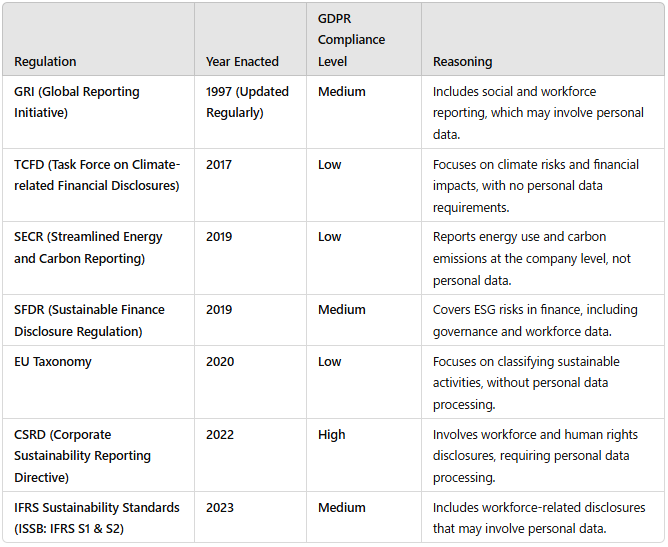
GDPR’s Core Principles
In the context of Environmental, Social, and Governance (ESG) reporting, businesses must ensure compliance with the General Data Protection Regulation (GDPR) when handling personal data related to employees, customers, and other stakeholders. GDPR is based on seven core principles that govern responsible data processing. Understanding these principles is essential for organizations integrating ESG disclosures while protecting privacy rights.
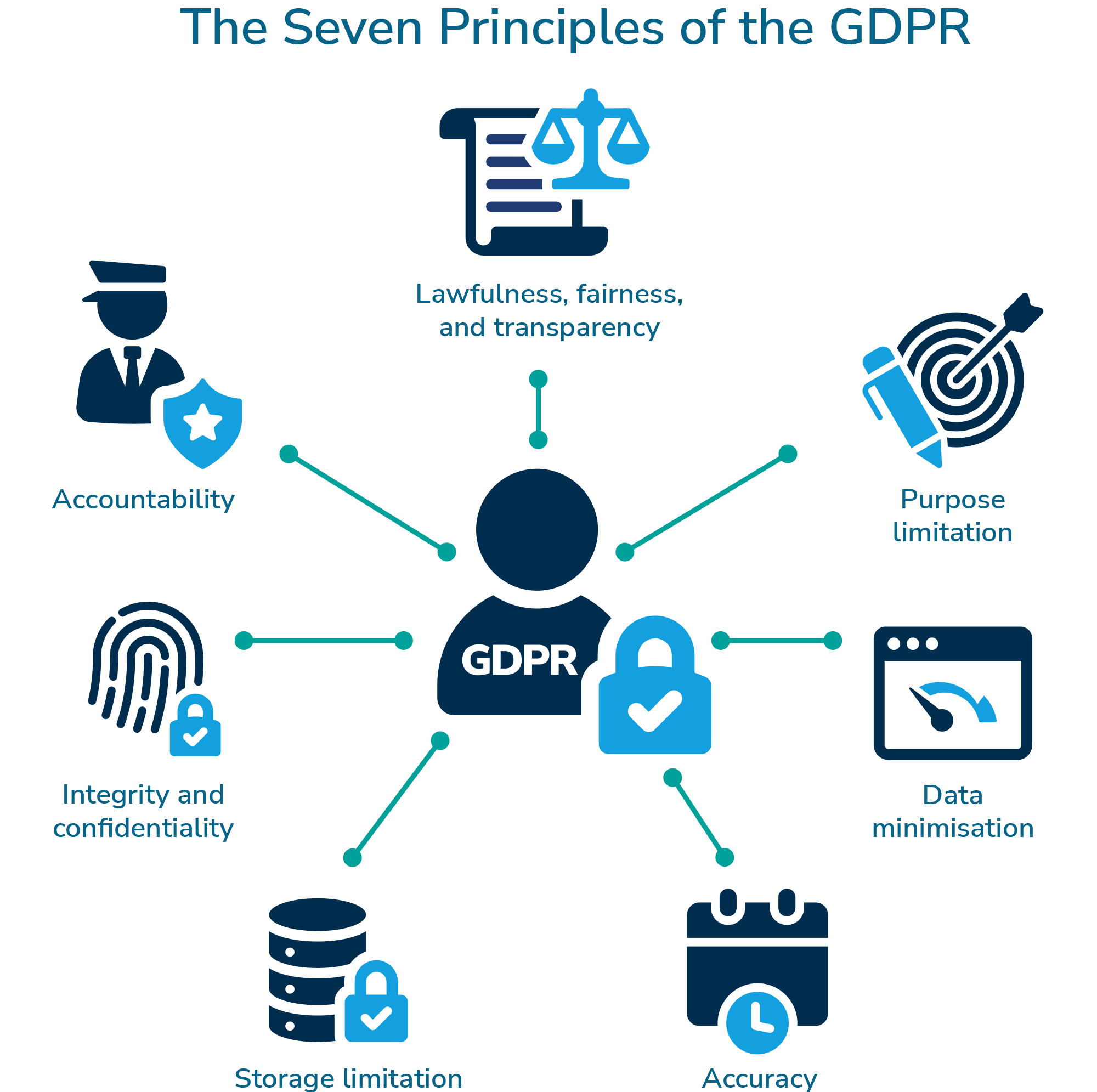
1. Lawfulness, Fairness, and Transparency:Organizations must process personal data in a lawful, fair, and transparent manner. This means they must have a valid legal basis for processing data (e.g., consent, legitimate interest) and provide clear privacy notices explaining how the data will be used in ESG reports.
2. Purpose Limitation:Personal data should be collected for specific and legitimate purposes and not used for unrelated activities. In ESG reporting, this means data collected for sustainability assessments cannot be repurposed for marketing or unrelated analytics without proper justification and user consent.
3. Data Minimization:Only the necessary personal data should be collected and processed. ESG disclosures should avoid excessive personal details, using aggregated or anonymized data where possible to ensure compliance.
4. Accuracy:Organizations must ensure that personal data used in ESG reports is accurate and up to date. If errors are found, they must be corrected promptly to maintain data integrity and regulatory compliance.
5. Storage Limitation:Personal data should not be kept longer than necessary for the intended ESG reporting purpose. Companies must define retention periods and establish secure data deletion policies once the data is no longer required.
6. Integrity and Confidentiality (Security):Businesses must safeguard personal data against unauthorized access, breaches, or misuse. In ESG reporting, this includes using encryption, access controls, and secure data-sharing practices to protect sensitive employee or stakeholder information.
7. Accountability:Organizations must be able to demonstrate compliance with GDPR. This requires maintaining records of data processing activities, conducting risk assessments, and ensuring that any ESG-related data processing adheres to regulatory requirements.
By aligning ESG reporting with these GDPR principles, companies can enhance data protection, regulatory compliance, and stakeholder trust, ensuring that sustainability efforts are conducted responsibly and transparently.
Ensuring GDPR Compliance in ESG Reporting
To comply with GDPR, companies must establish a lawful basis for processing personal data in ESG disclosures. This includes relying on explicit consent, legitimate interest, or regulatory requirements. For example, if an ESG report includes employee survey results or workforce diversity data, businesses must either obtain consent or ensure the data is aggregated and anonymized to remove identifiable details. Additionally, companies should provide privacy notices to inform employees and stakeholders about data usage. Without a clear legal basis, ESG disclosures risk non-compliance, regulatory scrutiny, and penalties.

Data minimization is also essential, requiring companies to collect only the necessary personal data for ESG reporting. For instance, workforce diversity tracking may include age or gender but should avoid sensitive personal details like contact information or private records. Companies must also implement data retention policies, ensuring that personal data is deleted once it is no longer needed. Furthermore, data collected for HR management should not be repurposed for ESG disclosures unless it aligns with GDPR’s purpose limitation principle.
To ensure compliance, businesses should integrate GDPR-aligned data governance into ESG strategies. This includes secure data processing, consent management, and internal audits. Companies working with third-party ESG consultants must establish Data Processing Agreements (DPAs) to maintain accountability. By prioritizing lawful and responsible data handling, organizations reduce compliance risks while enhancing the credibility of ESG disclosures. Ultimately, respecting data privacy strengthens corporate governance and builds long-term trust with stakeholders, investors, and regulators.
Compliance Risks and Solutions
Ensuring ESG disclosures comply with GDPR is critical to avoiding legal, financial, and reputational risks. Below are the key compliance challenges businesses face and best practices for mitigating them. The table below explains the key GDPR risks in ESG reporting:
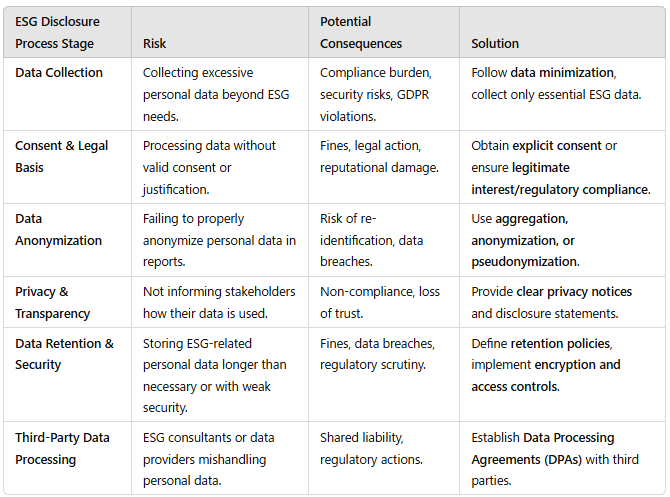
Ignoring GDPR in ESG disclosures exposes companies to legal, financial, and reputational risks, including regulatory penalties and loss of stakeholder trust. To mitigate these risks, businesses must limit data collection, ensuring they only gather necessary information while applying anonymization and aggregation where possible. They should also establish a lawful basis for data processing, such as explicit consent or legitimate interest, and provide clear privacy notices to stakeholders.
Additionally, companies must enforce strong security measures like encryption and access controls to protect personal data. When working with third-party ESG consultants, Data Processing Agreements (DPAs) help ensure GDPR compliance.
By integrating these data protection strategies, businesses can align ESG transparency with compliance, reducing risks while building trust with investors, regulators, and the public.

Why Work With ASUENE USA Inc.?
In today’s corporate landscape, ESG disclosure is no longer just a corporate responsibility—it’s a business necessity. Companies worldwide are under increasing pressure to report on their environmental and social impact, align with global sustainability frameworks, and meet regulatory requirements such as the EU’s Corporate Sustainability Reporting Directive (CSRD) and Task Force on Climate-related Financial Disclosures (TCFD). However, with this push for transparency comes a critical challenge: ensuring ESG data compliance with data privacy laws, including the General Data Protection Regulation (GDPR).
That’s where ASUENE USA Inc. comes in.
How we can assist:
- ESG Data collection: Streamline the collection of material ESG metrics while maintaining strict data privacy protocols
- Third-Party Verifications: Get the necessary independent verification for your GHG emissions reports, ensuring compliance and credibility.
- Consulting Services: Tailored advice to improve your sustainability practices and boost your overall environmental performance.
Our software allows you to automate the data collection process, reducing the man hours spent on manual data input and ultimately saving your company time, costs, and stress. With ASUENE USA’s comprehensive suite of services, you will have everything you need to meet global regulations and drive a more sustainable future for your business.
So, why not partner with us to streamline your reporting and environmental efforts? Let ASUENE USA Inc. help you stay ahead of the curve while making a positive impact on both your business and the planet.
Download Our Expert Publications

